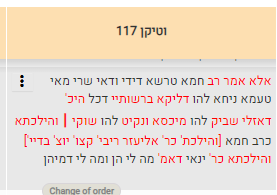Rav Huna vs. Rav Anan
(1) First off, here is a persuasive defense of the practice of schlissel challah, and why its origins are not necessarily pagan. Not that I am in favor of the practice, and how it is a minhag meme. But some of the absolutely sure rationalist explanations, that it comes from Christianity (hot cross buns) or paganism, and is avoda zara, is over the top.
(2) Anyway, a short post for Friday. In today’s daf (Bava Metzia 65b), there’s a seeming dispute between Rav Huna and Rav Anan. While presumably juxtaposed to the preceding Mishnah, it is understood to be a standalone dispute.
גְּמָ׳ מִי אוֹכֵל פֵּירוֹת? רַב הוּנָא אָמַר: מוֹכֵר אוֹכֵל פֵּירוֹת. רַב עָנָן אָמַר: מְשַׁלְּשִׁין אֶת הַפֵּירוֹת. וְלָא פְּלִיגִי. הָא דְּאָמַר: לְכִי מַיְיתֵית קְנִי. הָא דְּאָמַר: לְכִי מַיְיתֵית קְנִי מֵעַכְשָׁיו.
GEMARA: The ruling of the mishna is unclear, as it requires clarification: In a sale such as this, when the buyer has made only a partial payment, who enjoys the profits of this field in the interim period, until the entire transaction is complete? Rav Huna says: The seller enjoys the profits until he receives the full payment, while Rav Anan says: In the meantime they deposit the profits in escrow with a third party until the transaction is finalized. The Gemara comments: And Rav Huna and Rav Anan do not disagree. This one is referring to a case where the seller says: When you bring all the money you will acquire the field, whereas that one is referring to a case where he says at the time of the transaction: When you bring all the money you will acquire it from now.
And we are told by the Stamma that these two Amoraim don’t disagree, but are dealing with different cases.
Let us just note that Rav Huna and Rav Anan are second-generation Babylonian Amoraim. Rav Huna’s primary teacher is Rav. Rav Anan’s primary teacher is Shmuel. This is then likely a Rav and Shmuel dispute (or at least contrary statements, drawn from different cases).
(3) There is a vehilcheta stack right before the Mishnah. We’ve seen this elsewhere, IIRC when discussing Rabba vs. Rav Yosef. When the gemara, or perhaps later, decides to put a vehilcheta, they sometimes agav urcheih, along the way, review gemaras going back and list other halachic conclusions. And not always are all those preceding conclusions in every manuscript, so you have to wonder whether they were originally there.
We have here, at the top of 65b:
וְהִלְכְתָא כְּרַב חָמָא, וְהִלְכְתָא כְּרַבִּי אֶלְעָזָר, וְהִלְכְתָא כְּרַבִּי יַנַּאי, דְּאָמַר: מָה לִי הֵן וּמָה לִי דְּמֵיהֶן.
The Gemara summarizes the rulings in a number of the cases discussed above: And the halakha is in accordance with the opinion of Rav Ḥama, that his type of tacit interest agreement is permitted. And the halakha is in accordance with the opinion of Rabbi Elazar, that fixed interest can be reclaimed in court. And the halakha is in accordance with the opinion of Rabbi Yannai, who says: What difference is it to me if he referred to the produce, and what difference is it to me if he referred to the produce’s value? In other words, if one gave an item or money to another as payment of his loan, this is considered a sale without interest.
Here is Florence 8-9 which mentions Rabbi Eleazar (ben Pedat) but with Rabbi Yannai’s halacha, then inserts the midpoint. This may convincingly have originally been lost due to dittography of “vehilcheta”.
Yet, the elaboration of what Rabbi Eleazar said is also possibly inserted. Here is the much briefer Munich 95:
and here is Vatican 117 which omits both Rabbi Eleazar and his halacha:
I think that the plain progression of the gemara, and several named Amoraim, does work with Rabbi Eleazar ben Pedat over his disputant, Rabbi Yochanan. Still, that this vehilcheta about Rabbi Eleazar might not exist might be relevant in our prior discussion about how we might rule like Rabbi Eleazar, when his prooftext (or pretext) is used for another derasha, which we also rule like. Review that discussion here:
Shabbat shalom!






